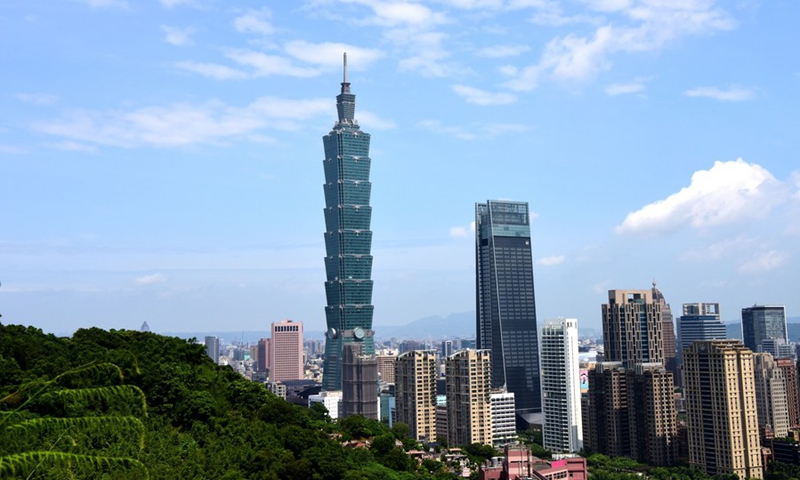
Photo taken on July 21, 2019 from Xiangshan Mountain shows the Taipei 101 skyscraper in Taipei, southeast China's Taiwan.(Photo: Xinhua)
The cross-Straits Economic Cooperation Framework Agreement (ECFA) between the Chinese mainland and the island of Taiwan will remain in effect, according to a tariff revision plan for 2022 released by the Customs Tariff Commission of the State Council on Wednesday.
The plan comes as many on the island have been raising concerns over potential changes to the ECFA, which offers preferential tariff rates for Taiwan exports to the mainland, as Democratic Progressive Party (DPP) authorities are constantly challenging the one-China principle and stirring up cross-Straits tension.
A summary of the tariff revision plan said that the mainland's trade links with the Hong Kong and Macao special administrative regions under the framework of the Closer Economic Partnership Arrangement, and the cross-Straits ECFA, have finalized tariff reductions and conventional tariff rates will continue to be levied.
The announcement will help allay certain concerns that there might be changes to the agreement, crucial ballast to the trade prosperity of the island of Taiwan, in the face of continued provocation by the secessionist DPP authorities, regional observers said.
The continuation of the ECFA agreement sent an important signal that the mainland's policy of continuing to promote cross-Straits economic and trade cooperation has not changed, which plays an important role in stabilizing the confidence of Taiwan businessmen and promoting cross-Straits cooperation, Wang Jianmin, a senior cross-Straits expert at Minnan Normal University in East China's Fujian Province, told the Global Times on Wednesday.
Under the ECFA, the mainland has implemented zero tariffs on more than 500 products from Taiwan, including agricultural products, aquatic products and industrial petrochemicals, which has boosted the island's overall exports to the mainland and backed up Taiwan's economic development, Wang said.
At a press conference on Wednesday, Ma Xiaoguang, a spokesperson for the Taiwan Affairs Office of the State Council, said that growth in cross-Straits trade and investment against a downward trend shows that the mainland has, is and will always be the hotspot for Taiwan firms to invest and prosper.
In the first 11 months of 2021, Taiwan's exports to the mainland and Hong Kong expanded by 25.7 percent year-on-year to reach $171.81 billion, a new high in recent years, Ma noted.
At the press conference, Ma also said that recent claims by certain Taiwan businessman that his factory in Northwest China's Xinjiang Uygur Autonomous Region "does not match the facts," adding that the mainland always attaches great importance to the protection of Taiwan businesses' legal rights and interests.
The mainland has always encouraged and supported cross-Straits economic and trade relations, which is totally different from the negative and hostile attitude of DPP authorities, experts also stressed.
"The growing trade volume has proved that even if the DPP authority has tried to restrict and hinder cross-Straits business activity, cross-Straits economic cooperation would by no means be derailed," Wang said.
On Wednesday, Ma also warned the DPP authorities against further undermining peace and stability across the Taiwan Strait, saying that taking such a risk and miscalculation will lead to its annihilation.
